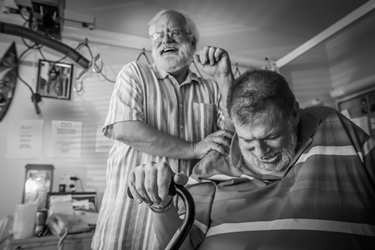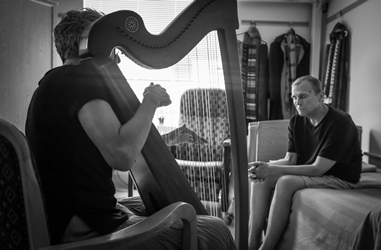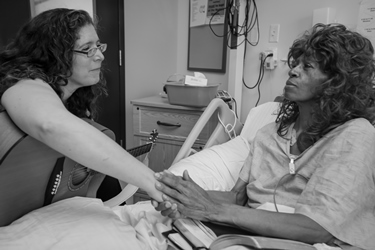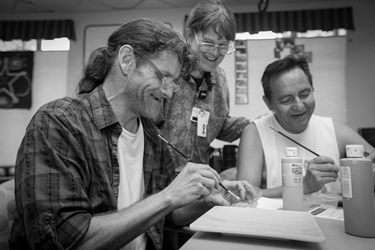Bailey-Boushay House Homefront
Newsletter August 2015 Edition
Inside this issue
The Healing Power of Massage, Music and Art | BBH END AIDS Walk Team | Who We Serve
 |
|
Massage therapist Bill Ames gives relief to Daniel.
|
The Healing Power of Massage, Music and Art
How complementary therapies improve quality of life for BBH residents
Faced with life-limiting illness, how can people who need round-the-clock care still live as fully and independently as possible?
In the 35-bed nursing home at Bailey-Boushay House, one answer to that question is complementary therapies.
In addition to highly skilled nursing care, residents get support in groups but also one-on-one with
Bailey-Boushay’s therapeutic harpist, artist in residence, massage therapist and music therapist.
“It’s about quality of life,” says Brian Knowles, executive director. “Complementary therapies can help people experience a sense of well-being and meaningfulness in the life they are living right now.”
We asked three frail residents —Beatrice, Jola and Melody— how they use complementary therapies to relieve the daily stresses of being seriously ill.
 |
|
Harpist Lyn Miletich plays for Timothy.
|
The gift of relaxation
Beatrice, who is blind, has been at Bailey-Boushay for about six months. Bailey-Boushay is a good place with great nurses, Beatrice says, but she doesn’t like going out of her room or being in groups.
A mother of three boys, she is a fluent speaker of both Swahili and English. Music and massage are her favorite complementary therapies.
She has discovered the pleasure of weekly massage for her shoulder and neck. “It makes my muscles feel relaxed,” she says. “My mind feels relaxed, too.”
Massage therapist Bill Ames comments: “A lot of anxiety gets caught in the body. If you can release muscles, a lot of the emotional stuff gets released.”
Strengthening and sharing family connections
Both Beatrice and music therapist Nadine Cadesky remember a day when singing together created a lovely, fresh experience for Beatrice and her family.
Nadine recalls that Beatrice quickly went from very tired to animated: “She was singing and drumming with her hand as the rest of us sang backup. The music brought her back to a time when she was not sick. It was beautiful to see that be so effective.”
“Singing together,” Beatrice says, “just makes you happy.”
Building a foundation for self-care
 |
|
Sharon connects with music therapist Nadine Cadesky.
|
Now 63, Jola (pronounced Yo-la) worked as a maid for many years. She has disabling physical challenges, including complications from diabetes and arthritis. She is also committed to managing lifelong mental-health problems.
“I’m kind of a sad and unhappy person for some reason,” she says. “I used to be very gloomy and not outgoing. My spirits are higher here than in any other place I’ve lived.”
She prizes her independence and embraces most invitations to be creative and social: “Here there are opportunities but I’m not pushed. It’s open to your own liking and disliking.”
Exploring new domains of
self-expression
Supported by all the complementary therapists, she continues to find ways to calm troubling emotions and ongoing anxieties.
Jola says listening to the supportive music of therapeutic harpist Lyn Miletich, “touches my emotions and calms my soul, my spirit.” And when Bill Ames and Lyn teamed up to give her simultaneous massage and harp music, Jola experienced a new kind of peace. “They listened to me and my body, and Bill could work the music right into my shoulder.
Jola feels encouraged to follow her creative interests in writing poetry (mostly for herself) and making music with other residents in Nadine’s instrumental improvisation group and new choir group.
All of this exploration, Jola says, gives her comfort and strength. “It stimulates me, relaxes me, and gives me something to lean on,” she says.
The liberating power of a creative challenge
Melody is Jola’s neighbor in the nursing home. After years as a gravely ill patient (including profound paralysis associated with HIV), Melody has found the environment she needs to thrive again as a creative person.
An award-winning novelist under the pen name Madelyn Arnold, she has strong local ties. From 1975 to 2004 she wrote a column for Seattle Gay News. She’s now hard at work on her fourth book.
“Life is spectacularly good here,” she says. “Staff went out of their way to make this a place in which I could get back to my writing, and I’m beyond delighted.”
 |
|
Art therapy provides a fun and creative outlet for clients.
|
Making art change lives
Melody gratefully uses all the complementary therapies available to residents. She’s found working with artist-in-residence Ross Palmer Beecher particularly restorative.
Melody uses paper mache to make what Ross calls “intricate critters.” So far she’s created a Happy New Year frog, an owl, a bird and a cat. The charming featherweight figures are glazed to look like fired pottery.
Ross has seen art improve quality of life for many Bailey-Boushay patients. “Seeing it makes me feel the arts are very important, right up there with doctors and nurses in helping people,” she says.
When asked, she explains it this way: When people make art, they’re solving problems and committing to finishing their projects. That takes their mind off their troubles and gives the mind a creative challenge. It’s a healthy distraction, she says, to forget about ourselves and choose to make something.
The importance of managing pain and anxiety without drugs
“Using lots of drugs to manage anxiety for our residents can leave them too woozy to experience their own lives,” says Brian Knowles.
The drug-free options provided by complementary therapies can help even very sick people retain more control of their lives and participate more fully in the present moment.
Back to Top
Join the Bailey-Boushay House Team at the 2015 END AIDS Walk!
The 28th Annual End AIDS Walk is being held on Saturday, September 26 at Volunteer Park in Seattle’s Capitol Hill neighborhood and Bailey-Boushay House is proud to once again be an Allied Partner. As an Allied Partner, BBH will receive a portion of the proceeds raised by the teams that designate us.
We would love to have you and your friends and family join us! Register today!
1. Click on “Join a Team” and use the scroll down button to choose “Bailey-Boushay House”
2. Enter your information to sign up
If it’s not possible for you to join as a walker, please consider supporting team “Bailey-Boushay House” by donating to the team Bailey-Boushay House page or sponsoring an individual team member.
The End AIDS Walk route is a 5K loop through Capitol Hill. The walk is followed immediately by the End AIDS Walk After-Party with family-friendly activities.
Back to Top
Back to Top